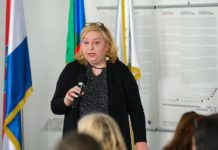Barbara Tartaglia Roca, a teacher of English and Spanish and a translator, has combined her two great loves, reading and travelling, into a unique Project titled Reading Around the World. Using books as her mean of transport, she travelled 196 countries in three years. What inspired her to undertake this journey, how she prepared, what she discovered and how at the end she sees the world, you will find in the interview we had with her. We are also proud to mention that our editorial has been collaborating with Barbara since the first issue of Phralipen Magazine.
How did it all start and what has inspired you to undertake this Project?
One day I read the information that British journalist Ann Morgan had read one book from every country in the world on the eve of the London Olympics. I immediately liked the idea, but it took me several months to decide to embark on such an undertaking myself. Before embarking on this project, I was, dare I say it, a “big traveller” myself, I travelled all continents except Australia. Travelling the world, I have always sought connections among humans in this confusing world. We find the behaviours and customs of South America in both Africa and Asia, not necessarily in exactly the same form, but very similar, because we are all so alike, we are all humans. I wanted to prove that “people are the same, wherever you go,” as Paul McCartney and Stevie Wonder sang in Ebony and Ivory. So, I wanted to discover the world through the pages of books, break the prejudices, better understand the world around me. People often say, They are so far away from me! Read the book! Get to know them!
But to begin with, it was not easy to determine how many countries there are on the globe. Some are recognised, some are not, so I opted for the United Nations list. These are 193 countries. And three others, Palestine, Kosovo and the Vatican, are my personal choice and not a member of the UN.
How did you manage to find such extensive and varied literature, how much did your foreign language knowledge help you, and which books were the hardest to come by?
Surprisingly enough, many books are available in Croatia. Due to the fact that Yugoslavia was a member of the Non-Aligned Movement, almost fifty percent of the books on my List can be obtained in the Zagreb City Libraries. The rest of them I bought on my e-book reader.
The most challenging part of the process was researching the literary oeuvre and finding a list of writers of each country, especially where the list was very short. This research, on the other hand, provided me with insights and knowledge about literatures that I knew nothing about at the beginning of the Project.
The choice of which book to choose, if possible, was, of course, driven by the idea of selecting the book that has the best reviews, however, sometimes I deliberately chose books that gave me a better insight into the lives of those countries, people and their customs.
This Project cannot be done without a solid knowledge of English, and certainly knowing another language is also helpful. For example, a book from San Marino is written in Italian, there is no translation in any other language, so my knowledge of Italian was certainly welcome. Understanding Portuguese helped me to read a book from Cape Verde in Africa, where Portuguese is the official language. Understanding French would have been a great asset since most of the good African literature is written in that language.
The most difficult books to come by were from Oceania countries because Oceanian literature is dominated by oral traditions, prayers and poems. A good part of Oceania has no writers, only women poets. One I even contacted in person, Teresa Teaiwa from Kiribati, and she sent me several of her poems. It is not poetry in the classical sense of the word, more a poetic short story, a form through which Oceania women articulate their everyday problems. There is a common prejudice in Oceania that the written word is cursed and that stories should be conveyed orally. They say for themselves, We belong to the sea where the islands move, disappear. So do nations, cultures, languages. We are sailors who read stars, winds, currents and horizons. Not books. We have built our homes on songs.
How long did it take you to realise your Project and read 196 books?
When I decided to make this my personal project, I did not set a time frame, because I think that frames only limit people, and leisure becomes an obligation. So I was reading the Project for three years, but with breaks because I also read other books that had nothing to do with the Project.
Which female authors’ literary works are represented in world literature, and is there a recurring theme in their works?
One of the selection prerequisites of my Project was, whenever possible, to read women’s literature. So there are many female authors on my List of 196 countries. From all over the world. My experience has shown that women’s literature is almost equally represented around the world, another question is how it is valued, however, I think that has also been changing with time.
It seems to me that the literature of the whole world is marked by the suffering of women on all continents! After all these books I have read, I conclude – everywhere in the world men take upon themselves the right to beat women, harass them in every possible way. The difference is that sometimes this story gets out on the street, and sometimes it stays exclusively in the house, such as in Arabic literature.
At the end of your Project what are your conclusions on people, their emotions, customs, cultures, their similarities and differences?
No matter the different colours, languages, food, the world is one, I would say. There are several topics that run through all the books, which equally bother all people. At the end of my reading, I made a list of topics that span across the continents: mixed marriages, a topic of inferiority, inferiority complex due to the geographical distance of the island from some known land, then the relationship to a wealthier neighbour and expats. Relations with neighbours in general. I realised that no one has “wonderful” relationships with their neighbours and that everyone has “their Southerners,” as a Bosnian man in Slovenia said in the movie Cheese and Jam, even when living in Iceland. Transition countries topics, immigrant stories in the US and Canada. There are equal customs – I found it fascinating to discover that in the Caribbean and Oceania there is the same custom of burying a placenta after giving birth in the back yard of the home so that the person has firmly grounded roots and always knows where their home is. New Zealand has a matutu and the Dominican Republic has fukú, the same inevitable fate they fear of being cursed regardless of the fact that they are separated by 13,434 kilometres and 15 hours by plane. Isn’t it amazing that two such remote parts of the world share the same customs and fears?
People everywhere in the world laugh at the same things and cry over the same sadnesses. And love is love everywhere.
What were your favourite reads and what would you recommend us to read?
To me, the greatest discovery and my personal favourite was the literature of the Caribbean. It fascinated me the same way that I was fascinated by South American literature some thirty years ago. No matter what we think of the Nobel Prize in Literature, the fact that 12 Caribbean countries have two Nobel Prize winners – Saint Lucia and Trinidad and Tobago – speaks for itself. The list of writers from Jamaica, for example, is very long, one better than the other. This literature is pretty much magic realism style, fabulism, my personally favourite literary style.
There is no favourite book. Books are like friends for me. You have the ones you meet in your young days and they forever mark your life (One Hundred Years of Solitude). You have the cute ones you immediately like but eventually forget about them (Scandinavian crime fiction). Some make you laugh (Mission London), some make you cry (Please Look After Mom). You meet some later in your life and you wonder – where have they been so far (Caribbean literature). You have those who enrich your life (The Sirens of Baghdad) and those you expect a lot and disappoint you (My Name is Red).












